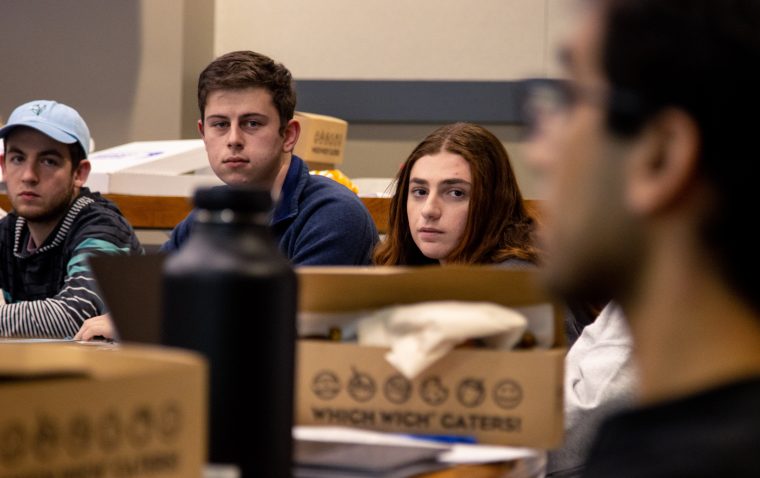News | Student Union
Student Union passes general budget using new streamlined process
Student Union unanimously passed the general budget for the 2020-2021 school year, Feb. 16, approving $3,756,970 of $4,246,843.70 total requested funds.
 Photo by Curran Neenan
Photo by Curran Neenan In contrast with last year’s 25-hour session, which was spread over two days, much of this year’s planning was conducted during several meetings over the past few weeks in committees composed of legislative body members. These changes resulted in a single eight-hour joint session of SU to pass the budget.
Speaker of the Treasury junior Alexa Jochims presented the blueprint for the new structure at a Nov. 19 joint session with the idea that the new structure would allow for more preparation and collaboration between Senate and Treasury, as well as to allow the process to run more efficiently.
The five committees, Allocation Boards & Appeals, Campus Contributions, Large-Scale Programming, Student Union Entities and Student Union Programming, all included a chair from either Senate or Treasury and a co-lead from the opposite legislative body in order to diversify the legislative members tending to each area.
Speaker of the Senate junior Steven Kish said the discussions and questioning were more thorough due to the fact that senators and treasury representatives had spent significant time reviewing the budget recommendations.
“It just really helps people collaborate on the front end and get all of the synthesized opinions out there,” Kish said. “So people could really thoughtfully consider them instead of like, trying to make everything up on the spot.”
Jochims also said implementing a mechanism that required the legislative body to prepare in advance streamlined the process.
“This year, implementing a more intentional structure of how people are supposed to prepare…put [treasury representatives and senators] in a position where they were able to come in and be aware of the big picture, but then also be experts on their individual section as well,” Jochims said.
According to Kish, this increased collaboration and prior familiarity with the recommendations allowed for discussions to be more contentious in addressing budget items because members had been given more time in advance to fully formulate their thoughts.
“It doesn’t make sense to talk about $30 for five minutes when you have to get through $3.76 million,” Kish said.
During the session, Social Programming Board did not receive any funding for special events, for which the organization requested $12,000, but will allow them to potentially utilize funds from SU’s $40,000 executive appeals account to host specific special events as needed.
“Representatives felt that we hold student groups to a really high standard of telling us what their programming is going to be before we fund it, whereas if we just give SPB $2,000 for a special event, that the specificity isn’t at that level at the time of the general budget,” Kish said.
While both Kish and Jochims favored the new structure, both also offered potential suggestions to make the process even better in the future.
Jochims pointed out that having a method in place for committee members to prepare more thoroughly for items not pertaining to their committee could improve future general budget sessions.
“Making representatives aware that while their section is obviously incredibly, incredibly important, every other section that we’re looking at as well is going to fit in differently,” Jochims said. “And all those ultimately have to balance in the end. So helping reps be more aware of that from the get-go in the future will be really, really helpful.”
Kish suggested the idea of redistributing some of the workload among committees to account for the fact that some categories had more requests and therefore required more deliberation.
“Having opportunities for outreach and more discussion, more engagement with other members of SU, and then also students and other student groups on campus, and…having that same opportunity with about 10 times more preparation, actually heading into yesterday’s session really made everyone aware of the gravity of the decisions that we’re making and how to make them in the best way possible,” Jochims said.
SU VP of Finance junior Ariel Ashie, who led the SU session, expressed her satisfaction with the new process.
“Honestly, I was just very impressed. I think it’s one of the most important things that we do, and I think everyone did a really good job at making sure that we were centering students and what the student body wants and needs,” Ashie said. “It was really important to me to make sure that everyone knew that our objective going into Saturday was to have a balanced budget that best serves the student audience, so I think we did a really good job.”
